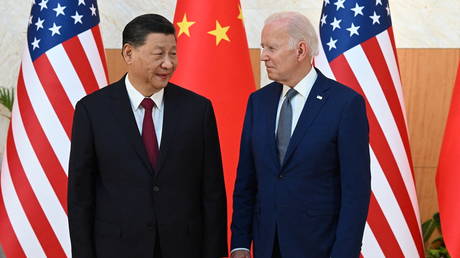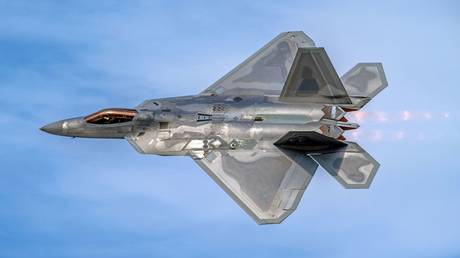
Nothing lasts forever, and the pair could collapse under the sheer weight of their own ideological and geopolitical obsessions.
Modern international relations scholarship has torn itself inside out trying to define the nature of modern superpowers. What distinguishes a true claimant to the title from the rest? Is there a universal set of characteristics that distinguishes a single leader from a multitude of outsiders?
Until now, the key criteria of a “superpower” has been considered by scholars mainly in material terms. It must have economic potential, military power, critical technologies, a developed scientific and industrial base, and human capital that far exceeds that of other countries. The sum of these material capabilities provides a non-negotiable, but measurable, criterion for ranking states.
Intangible factors are much more complex. They are difficult, if not impossible, to quantify. Assessing them is too subjective and potentially biased. Whose culture is stronger? Whose ethics are correct? Whose value system is better? Such questions lead to theoretical arguments, but do little to distinguish superpowers from other actors in the international arena, and here lies one of the most important factors.
We could suggest that the notable difference between a superpower and lesser peers is the existence of a systematic and coherent political philosophy of international relations. A superpower offers its own unique perspective on how the world should be structured, by what rules it should exist, what its purpose is, and why this particular country is legitimate in its role.
Of course, political philosophy is not just a collection of slogans and clichés. It is not only a pretty package or a simulation, an ideology or, indeed, a utopia. All this may be a derivative of the theme, but it should not exhaust its content. It is a specific interpretation of key political concepts in international relations – power, authority, justice, equality and the like. Such an understanding should be based on a deep intellectual tradition and one’s own practical experience, which make the arguments of the proposed doctrine convincing both for oneself and for others.
Can a country represent a value based on material factors alone? Undoubtedly. A state can concentrate considerable power and live solely on the principles of realism, pursue pragmatic policies, promote its economic interests and achieve domination wherever possible. However, naked realism will sooner or later reach the limits of its legitimacy. The rule of the bayonet and the purse will be shaky without a clear understanding of why, and for what reason, it exists.
Can a country have an influential political philosophy while being materially backward? Certainly. At a certain point it can be a model of stoicism or heroism, a bearer of innovative and attractive ideas. But without a solid fiscal base, these run the risk of hanging in the air and remaining as wishful thinking.
It is noteworthy that there are surprisingly few countries with both material power and a political philosophy of their own. It seems that creating such a doctrine is much easier than building a missile or a nuclear bomb. Put “clever people” in charge, process the results of their “brainstorming”, write some basic works and turn them into manuals for propagandists, and that is all! In reality, many such efforts crumble and get lost in the noise of information. A few copies remain in the hands of a few people.
Must the political philosophy of a superpower be “sovereign”? Should it be based solely on a national intellectual tradition? The answer tends to be “no”. Exceptionally original political-philosophical doctrines with a global impact are extremely difficult to find. They are usually a mixture of universal ethical principles, categories of major political-philosophical doctrines such as liberalism, socialism or conservatism, nationally specific views and principles, and even religious doctrines such as Christianity or Islam.
There are only two countries in the world today that combine both significant material potential and their own political philosophy. They are the United States and the People’s Republic of China.
The political-philosophical core of the US is well known and widely reproduced at all levels – from university monographs and textbooks to propaganda videos and social media posts. It is based on liberal principles, with their supremacy of human reason, the idea of “freedom from adversity”, justice as fairness, equality of opportunity within uniform rules, and derived ideas of democracy as the optimal form of government and the market as the organization of the economy. This political-philosophical code is a product of the European Enlightenment and the specific experience of organizing the internal life of European countries, which was embodied on the basis of the American political experience and multiplied by the material power of the United States. The European roots of US political philosophy make it easy for it to take root in many Western countries, even if in some places it contradicts individual interpretations “on the ground”. Importantly, there is also a strong modernist potential in such a political philosophy, because, in general, it’s one of emancipation, liberation and rational progress.
China’s political-philosophical pivot is far less known, simply because Beijing has not yet sought to actively promote it abroad. Its messaging has long remained largely nationally focused. But it is systemic, deeply reflective and has great potential beyond China’s borders. It is based on the view of international relations as a non-zero-sum game, the idea of collectivity, and a departure from rivalry as the leitmotif of world politics. The strong element of Marxism in contemporary Chinese political philosophy gives it a modernist potential combined with the experience of dealing with the country’s own key problems. It combines the ideas of people’s democracy with the successful experience of fighting poverty, overcoming underdevelopment and reducing social inequalities. In today’s world, China appears as a country whose ideas have been tested by practice. Yes, many of its successes have been made possible by its integration into the Western-centered global economy. But here, too, China tends to follow its own philosophical line – using cooperation, borrowing Western experience and combining it with its own traditions. In effect, Marxism is a Western doctrine put at China’s service.
Will there be a clash of political philosophies between the US and China? Most likely yes, because Beijing is perceived in the US as a long-term threat. China avoids copying and “mirroring” American accusations against it by promoting the idea of playing the non-zero-sum game, thereby making its political philosophy an even more visible alternative. One could argue for a long time whether it is material factors or ideas that are primary in the contradictions between the powers. Obviously, if necessary, differences in ideas can be used for political mobilization and the consolidation of allies. The more systemic such ideas are, the easier it is to draw dividing lines.
Are the political philosophies of the US and the PRC self-sufficient? No. Both the US and China combine their political philosophies with the principles of realism. Like many other actors, they assume the risk of worst-case scenarios and prepare for them by accumulating resources for mutual deterrence. However, political philosophy allows them to maintain or claim global legitimacy for their influence.
Does Russia have a political philosophy of its own? The answer so far is it does not. Russia has returned to the principles of realism in its foreign policy, which was an achievement on its own. But it is too early to speak of a systematic and well-developed political philosophy. There are still a number of vague, sometimes contradictory ideas, concepts, interpretations and slogans derived from them. There is a clear lack of modernist potential in the Russian system of views. Its necessity may be debatable in itself, but it is clearly embedded in the US, China and in many lesser powers.
Russia has recently experienced the collapse and loss of its political-philosophical project, which began to rot long before the disintegration of the USSR. Perhaps it is the Soviet experience that still causes a persistent and unconscious allergy to political philosophy. It is also possible that both the US and China will at some point face the same problem that the Soviet Union had – a disconnect between its doctrine and the real state of affairs. Perhaps freedom from political philosophy is now Russia’s advantage. Maybe Russia will develop its own unique experience, which will allow it to avoid mechanically copying others’ ideas and mixing them with its own practice. The maturation of political philosophy takes time, as does the cultivation of its material base.




